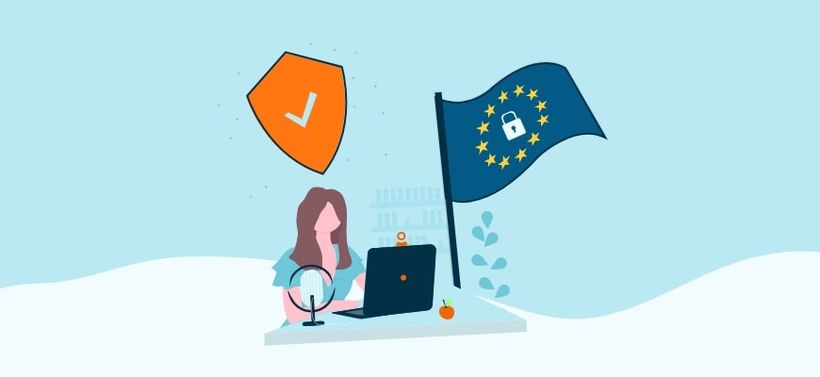WebinarGeek and GDPR
Remco
13 April 2018 - 4 min
What is GDPR? From all sides, you’re handed information, wanted and unwanted. Sometimes it gives you a clarification but also raises more questions.
We won’t take on the role of advisor or tell you what to do or not to do. What we will do is show you what we’re doing to prepare ourselves for these regulations. And what we do to make sure you’ll also be GDPR-proof when it comes to your webinars.
We think it’s a positive development. Everyone within the EU will be dealing with the same regulations, which seems fair. It also ensures companies are obliged to think about privacy and security to prevent data breaches. A great time to reflect on ourselves and take a detailed look at our processes.
In this article, you’ll read all about the GDPR that involves WebinarGeek. We love to give you a look behind the scenes and show you how we filled in our internal processes. And obviously, how we ensure you’ll be GDPR-proof when it comes to your webinars.
How To Make Sure You’ll Be GDPR-Proof?
At least when it comes to your webinars ;-)
Below you’ll be able to read more about how the GDPR will have on webinars and your WebinarGeek account. You’ll also be able to see which adaptations and additions we did to ensure our users will all be GDPR-proof.
The benefits of GDPR for your business
With GDPR, your company will experience several benefits. First of all, it forces you to think about the most important privacy and security questions regarding your business practices. This allows you to show your clients and potential clients you prepared yourself well.
The new regulation gives you a better insight into the real needs of your webinar participants. By having a clear vision, you can serve them better and exceed their expectations.
The GDPR ensures subscribers will know exactly which type of data is collected and how this data is being used.
Because subscribers can easily edit their personal profiles and permissions, this will help reduce the amount of unwanted emails.
What will the registration process look like for webinars and the end user?
When registering for a webinar the individual needs to accept your privacy statement. In that statement, you indicate how you will use the personal data you request from individuals.
It requires explicit and unambiguous permission to send commercial messages through email.
That means the following. When you’d like to add people who subscribe to your webinar to your mailing list, you’d need to separately request explicit and unambiguous permission to do this. This permission can be granted through the addition of a so-called permission checkbox to the registration form for your webinars.
The field “Last name” is turned off by default for newly created webinars.
How will it look like in your WebinarGeek account?
The retention period for inactive accounts is limited.
An inactive account including all data and records is stored for a limited amount of time and deleted afterwards.
It is possible to remove your entire WebinarGeek account including all data and recordings.
There is a “Security” section in your account. This section contains an overview of all subjects regarding this topic.
A Data Processing Agreement (DPR) is available in your account. You can approve and download it from there.
Add a two-step verification procedure. You can now secure your WebinarGeek account even better with the activation of two-step verification.
All stored data of a specific individual can be looked up using their email, and if needed it will be sent to the individual.
All data that is collected using “permission fields” can be recovered from your webinar statistics dashboard. In that way, you’ll always be able to comply with the obligation of proof that is being introduced with the GDPR.
What can you do right now as a webinar organizer?
Only ask for the information you need from someone who wants to register for your webinar. Standard required information includes a name and email.
Don’t important contacts for a webinar when you didn’t explicitly get permission from the contacts.
What can you expect from us?
Data Processing Agreement (DPR). You can find a DPR under the section “Security”. This can be viewed online, approved, and downloaded.
This agreement is mandatory and is relevant for all forms of personal data processing that WebinarGeek performs with regard to you.
The possibility to add a so-called permission field to the registration form. You can use this to ask participants’ permission for e.g. commercial emails.
The information for the permission that participants provide will be stored in your account.
That means you can always access that data by exporting it to .CSV and see who agreed to what and when.
Want more general information about the GDPR?
Please read our blog post "What is the GDPR?" or read more on the official GDPR website.
Your webinar save and secured?
Download the GDPR webinar checklistRelated articles
7x How to start a conversation during a virtual event
Do you think webinars are mostly about sending information? Then you're wrong! Your virtual event is the perfect opportunity to start a conversation.
Hosting a webinar? 6 Do’s and Don’ts to remember
Want to host successful webinars? Here are the do's and don'ts of webinar hosting.
How to make your webinars GDPR-compliant
In this blog, we explain what the GDPR means for your webinars and your WebinarGeek account.
/f/110864/617x610/52eece8aa9/remco.png)

/f/110864/870x400/77c38937f7/webinargeek-and-gdrpat2x.jpg)

/f/110864/1200x630/78196da2cd/og-image-start-a-conversation.png)

/f/110864/870x400/fca8b66d59/hosting-a-webinar-6-do-s-and-don-ts-to-rememberat2x.jpg)

/f/110864/1200x630/723fce5c61/webinargeek-and-gdpr.png)
